 W
WKōsō Abe was an admiral in the Imperial Japanese Navy during World War II.
 W
WHatazō Adachi was a general in the Imperial Japanese Army during World War II.
 W
WMasao Baba was a general in the Imperial Japanese Army, commanding the Japanese ground forces of the Borneo Campaign of 1945 in the closing months of the war.
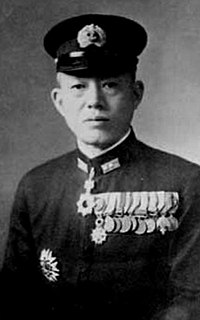 W
WMarquis Tadashige Daigo was a vice admiral in the Imperial Japanese Navy during World War II.
 W
WDate Junnosuke , known as Zhang Zongyuan in Chinese after changing his name and nationality, was a Japanese bandit and ronin active in early 20th century China. He was a part of the Manchu-Mongol Independence Movement and the Shandong Autonomy Movement. He was a descendant of Date Masamune and a member of the Date clan.
 W
WKenji Doihara was a Japanese army officer. As a general in the Imperial Japanese Army during World War II, he was instrumental in the Japanese invasion of Manchuria.
 W
WShigeru Fukudome was an admiral and Chief of Staff of the Imperial Japanese Navy during World War II.
 W
WChūichi "King Kong" Hara was a Japanese admiral in the Imperial Japanese Navy during World War II. Heavier and taller than the average Japanese person, in his youth he was nicknamed "King Kong" by his friends.
 W
WShunroku Hata was a Field Marshal (Gensui) in the Imperial Japanese Army during World War II. He was the last surviving Japanese military officer with a marshal's rank. Hata was convicted of war crimes and sentenced to life imprisonment in 1948, but was paroled in 1954.
 W
WKiichirō Hiranuma was a prominent pre–World War II right-wing Japanese politician and Prime Minister of Japan in 1939. He was convicted of war crimes and sentenced to life imprisonment.
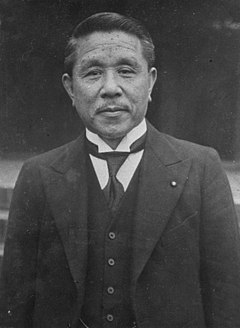 W
WKōki Hirota was a Japanese diplomat and politician who served as Prime Minister of Japan from 1936 to 1937. Originally his name was Jōtarō (丈太郎). He was executed for war crimes committed during the Second Sino-Japanese War at the Tokyo Trials.
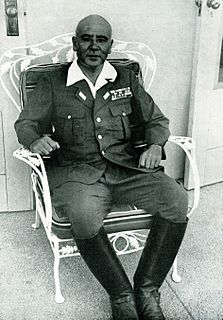 W
WMasaharu Homma was a lieutenant general in the Imperial Japanese Army during World War II. Homma commanded the Japanese 14th Army, which invaded the Philippines and perpetrated the Bataan Death March. After the war, Homma was convicted of war crimes relating to the actions of troops under his direct command and executed by firing squad on April 3, 1946.
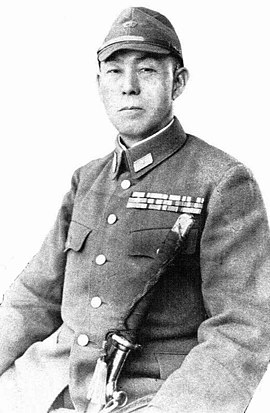 W
WHong Sa-ik, and was also known by the Japanese pronunciation of his name - Shiyoku Kō, was a lieutenant general in the Imperial Japanese Army, and the top-ranking ethnic Korean in Japan to be charged with war crimes relating to the conduct of the Empire of Japan in World War II.
 W
WHitoshi Imamura was a general who served in the Imperial Japanese Army during World War II.
 W
WMasazumi Inada was a lieutenant general in the Japanese Imperial Army during World War II.
 W
WSadae Inoue was a general in the Imperial Japanese Army in World War II. He commanded the Japanese forces at the Battle of Peleliu and the Battle of Angaur.
 W
WRensuke Isogai was a general in the Imperial Japanese Army and Governor of Hong Kong under Japanese occupation from February 20, 1942 to December 24, 1944.
 W
WSeishirō Itagaki was a Japanese military officer and politician who served as a general in the Imperial Japanese Army during World War II and War Minister from 1938 to 1939.
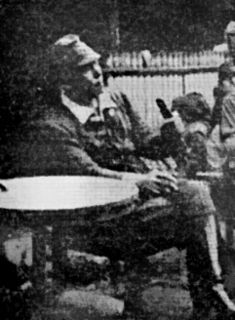 W
WTakeo Itō was a general in the Imperial Japanese Army during World War II.
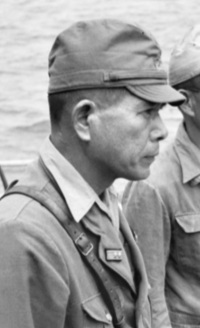 W
WMichiaki Kamada was a vice-admiral of the Imperial Japanese Navy and saw service in the Pacific Theatre of World War II.
 W
WMasatane Kanda , was a lieutenant general in the Imperial Japanese Army during World War II.
 W
WCaptain Eikichi Kato was a senior officer in the Imperial Japanese Navy during World War II. Kato was the senior officer of the Imperial Japanese Navy forces on the Bonis Peninsula and Buka Island during the latter stages of World War II.
 W
WKiyotake Kawaguchi was a general in the Imperial Japanese Army during World War II.
 W
WOkinori Kaya was the Minister of Finance of Japan between 1941 and 1944. In 1945, he was captured by the Allies, tried by the International Military Tribunal for the Far East and sentenced to twenty years imprisonment. Paroled in 1955, he later served as Minister of Justice from 1963 until 1964.
 W
WMarquis Kōichi Kido served as Lord Keeper of the Privy Seal of Japan from 1940 to 1945, and was the closest advisor to Emperor Hirohito throughout World War II. He was convicted of war crimes and sentenced to life imprisonment, of which he served 6 years before being released in 1953.
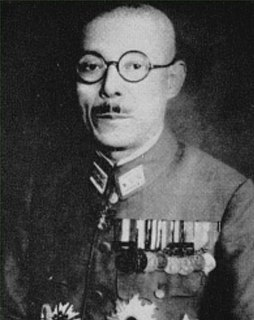 W
WHeitarō Kimura was a general in the Imperial Japanese Army. He was convicted of war crimes and sentenced to death by hanging.
 W
WKuniaki Koiso was a Japanese general in the Imperial Japanese Army, Governor-General of Korea and Prime Minister of Japan from 1944 to 1945.
 W
WShigenori Kuroda was a Japanese lieutenant general of the Japanese Imperial Army and the Japanese Governor-General of the Philippines during World War II.
 W
WIwane Matsui was a general in the Imperial Japanese Army and the commander of the expeditionary force sent to China in 1937. He was convicted of war crimes and executed by the Allies for his involvement in the Nanjing Massacre.
 W
WJirō Minami was a general in the Imperial Japanese Army and Governor-General of Korea between 1936 and 1942. He was convicted of war crimes and sentenced to life imprisonment.
 W
WRenya Mutaguchi was a Japanese military officer, lieutenant general in the Imperial Japanese Army during World War II and field commander of the IJA forces during the Battle of Imphal.
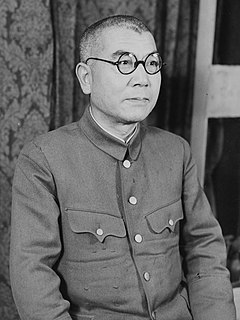 W
WAkira Mutō was a general in the Imperial Japanese Army during World War II. He was convicted of war crimes and was executed by hanging.
 W
WTakuma Nishimura was a Japanese army general in the Imperial Japanese Army during World War II. After the Japanese surrender, he was tried by Britain and later Australia for war crimes. He was executed in the then Australian territory of Papua and New Guinea. Nishimura was a native of Fukuoka prefecture.
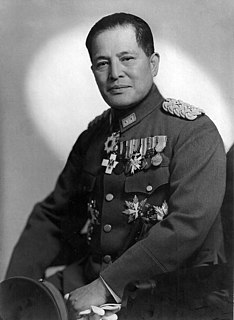 W
WBaron Hiroshi Ōshima was a general in the Imperial Japanese Army, Japanese ambassador to Germany before and during World War II and (unwittingly) a major source of communications intelligence for the Allies. His role was perhaps best summed up by General George C. Marshall, who identified Ōshima as "our main basis of information regarding Hitler's intentions in Europe". After World War II, he was convicted of war crimes and sentenced to life imprisonment, but was paroled in 1955.
 W
WTakashi Sakai was a lieutenant general in the Imperial Japanese Army during World War II, known for his role as Governor of Hong Kong under Japanese occupation.
 W
WShigematsu Sakaibara was an admiral in the Imperial Japanese Navy, the Japanese garrison commander on Wake Island during World War II, and a convicted war criminal.
 W
WNaomasa Sakonju was an admiral in the Imperial Japanese Navy in World War II.
 W
WShigeru Sawada was a career military officer and a lieutenant general in the Imperial Japanese Army during World War II.
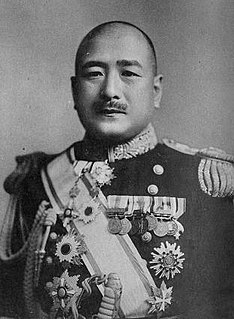 W
WShigetarō Shimada was an admiral in the Imperial Japanese Navy during World War II. He also served as Minister of the Navy. He was convicted of war crimes and sentenced to life imprisonment.
 W
WToshio Shiratori was the Japanese ambassador to Italy from 1938 to 1940, adviser to the Japanese foreign minister in 1940 and one of the 14 Class-A war criminals enshrined at Yasukuni.
 W
WToshinari Shōji was a major general in the Imperial Japanese Army during the Pacific campaign in World War II.
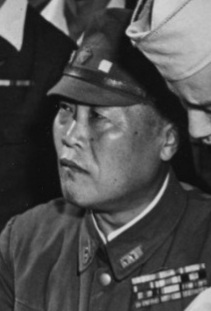 W
WYoshio Tachibana was a lieutenant general in the Japanese Imperial Army during World War II. He was commander of the Japanese garrison in Chichijima, Ogasawara Islands, and was later tried and executed for the Chichijima incident, a war crime involving torture, extrajudicial execution and cannibalism of American prisoners of war.
 W
WMoritake Tanabe was a general in the Imperial Japanese Army during World War II, commanding the IJA 25th Army from April 1943 until the surrender of Japan. He was the brother-in-law of General Hitoshi Imamura.
 W
WHisakazu Tanaka was a lieutenant general in the Imperial Japanese Army, and governor of Japanese-occuped Hong Kong in World War II. His name is occasionally transliterated "Tanaka Hisaichi".
 W
WHisao Tani was a lieutenant general in the Imperial Japanese Army in the Second Sino-Japanese War. He was implicated in the Nanjing Massacre and was executed by the Chinese government.
 W
WShigenori Tōgō was Minister of Foreign Affairs for the Empire of Japan at both the start and the end of the Axis–Allied conflict during World War II. He also served as Minister of Colonial Affairs in 1941, and assumed the same position, renamed the Minister for Greater East Asia, in 1945.
 W
WHideki Tōjō was a Japanese politician and general of the Imperial Japanese Army (IJA) who served as Prime Minister of Japan and President of the Imperial Rule Assistance Association for most of World War II. During his years in power, he assumed several more positions including Chief of Staff of the Imperial Army before ultimately being removed from office in July 1944.
 W
WYoshijirō Umezu was a Japanese general in World War II and Chief of the Army General Staff during the final years of the conflict. He was convicted of war crimes and sentenced to life imprisonment.
 W
WTakaji Wachi was a lieutenant general in the Imperial Japanese Army during the Second Sino-Japanese War and World War II.
 W
WOtozō Yamada was a career officer and general in the Imperial Japanese Army, serving from the Russo-Japanese War to the end of World War II.
 W
WTomoyuki Yamashita was a Japanese general of the Imperial Japanese Army during World War II. Yamashita led Japanese forces during the invasion of Malaya and Battle of Singapore, with his accomplishment of conquering Malaya and Singapore in 70 days earning him the sobriquet "The Tiger of Malaya" and led to the British Prime Minister Winston Churchill calling the ignominious fall of Singapore to Japan the "worst disaster" and "largest capitulation" in British military history. Yamashita was assigned to defend the Philippines from the advancing Allied forces later in the war, and while unable to prevent the Allied advance, he was able to hold on to part of Luzon until after the formal Surrender of Japan in August 1945.
 W
WIsamu Yokoyama was a general in the Imperial Japanese Army, commanding Japanese ground forces in China during the Second Sino-Japanese War and Pacific War.
 W
WShizuo Yokoyama was a lieutenant general in the Imperial Japanese Army in World War II, who is noted for his role in the Battle of Manila during the final days of World War II.